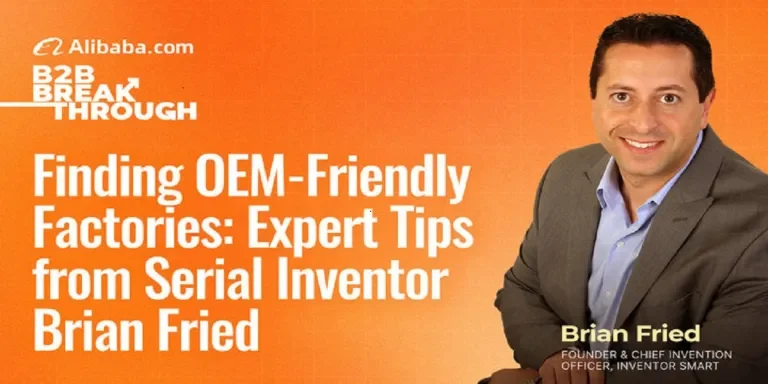In the latest episode of B2B Breakthrough, host Ciara Cristo sits down with Brian Fried, serial inventor and Chief Inventor at Inventor Smart, to uncover the hidden path between brilliant ideas and successful products. With 15 patents to his name and nearly two decades coaching inventors, Brian reveals why so many great product ideas never reach consumers – and how today’s manufacturing landscape makes bringing products to market more accessible than ever.
One of the most eye-opening revelations from this conversation is the widespread misconception about manufacturing costs. Brian shares a story about an inventor who assumed she needed $25,000 for tooling and $4 per unit for production. After investigating actual factories through Alibaba.com, they discovered the reality: just $600 for tooling and 80 cents per unit with a minimum order of only 3,000 pieces. “A lot of people think that manufacturing a product is much more expensive than it actually is,” Brian notes, pointing out how this single misconception keeps countless viable products from reaching market.
Table of Contents:
Vetting factories without boarding a plane
The intellectual property protection imperative
When licensing fails: Manufacturing as Plan B
Leveraging AI tools for smarter invention
Key takeaways for entrepreneurs
Listen to the full conversation
Vetting factories without boarding a plane
Trust verification is essential when working with overseas manufacturers, and Brian has developed a practical system that doesn’t require international travel. Among his most powerful techniques is leveraging video calls to virtually tour facilities. “I ask them, ‘Are you in the factory right now? I’d like to take a tour – put me on video and walk me around,'” he explains. This approach allows inventors to verify capabilities, assess working conditions, and ensure they’re speaking directly with factory representatives rather than middle agents who might add markup costs.
Beyond virtual tours, Brian recommends starting with a simple transaction before committing to production. “Send something to me so I can see. Are they receptive and responsive? Are they delivering when they say they’re going to deliver? Was it easy to make a payment?” This small initial investment helps entrepreneurs gauge reliability before spending thousands on tooling and inventory.
The intellectual property protection imperative
For small business owners and aspiring entrepreneurs with limited budgets, intellectual property protection often seems like an optional expense. Brian strongly disagrees. “If we skip that step, then we’re more vulnerable to somebody copying it because they have a right to. If you protect it and they ripped you off, that’s a different story.” Protection not only defends your innovation but creates options, particularly if manufacturing isn’t the right path.
Brian emphasizes the value of tools like Axio from Alibaba.com that help validate product concepts early in the development process. “When somebody talks to me about an idea, I can generally describe it in the platform and it comes out with relevant comparisons,” he explains, noting how this helps determine if an idea warrants further investment in prototyping and patents.
When licensing fails: Manufacturing as Plan B
What happens when the licensing approach doesn’t work out? Brian encourages entrepreneurs to consider manufacturing as a viable alternative. “When all the companies say no, does that mean your idea sucks? Or is it not the right time for them?” he asks. A company’s decision not to license may reflect their inventory levels or market strategy more than your product’s potential.
For e-commerce sellers and digital entrepreneurs looking to expand their product lines, Brian suggests starting with a unique “anchor” product that can be supplemented with complementary items. This approach helps maximize customer lifetime value while minimizing the risk of each product launch – a strategy especially valuable when battling tight margins in competitive online marketplaces.
Leveraging AI tools for smarter invention
Brian’s approach has evolved with technology, particularly in the realm of artificial intelligence. The Axio tool from Alibaba.com has become an integral part of his process for validating product concepts, estimating costs, and finding suitable manufacturing partners. “I put in a barber shop, I put in a roller rink… it showed me all the things I needed for those types of businesses,” he explains, highlighting the platform’s versatility for product sourcing and business planning.
While valuing these technological advances, Brian maintains that human judgment remains essential. “When I ask a question to AI, I find myself going onto multiple platforms to validate if that’s the right answer,” he notes, emphasizing the importance of balancing technological insights with personal expertise.
Key takeaways for entrepreneurs
This insightful conversation between Ciara Cristo and Brian Fried offers several crucial lessons for anyone developing products:
Manufacturing Costs Are Lower Than You Think – Get actual quotes before assuming production is too expensive; costs are often a fraction of what inventors estimate. Virtual Verification Works – Use video calls and small test orders to assess factories without expensive international travel. Protect Your Intellectual Property – Patents create options for both licensing and manufacturing while providing essential protection. Multiple Paths to Market Exist – If licensing doesn’t work, manufacturing your own product may be more affordable than you realize. Build Strategic Factory Relationships – Look beyond initial production to assess capacity for scaling, packaging capabilities, and materials certification.
Listen to the full conversation
For an in-depth look at these insights and more, tune in to this episode of B2B Breakthrough with Ciara Cristo and Brian Fried. Whether you’re a seasoned product developer or just starting with your first invention, this episode provides practical strategies to navigate the manufacturing landscape with confidence.




